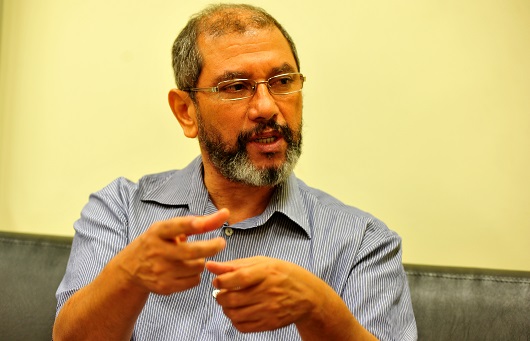Epidemiologist explains how inaccurate information could hamper the fight against yellow fever

22/03/2018
Luiza Medeiros (CEE/Fiocruz)
One often overlooked dimension of the challenges posed by the current yellow fever outbreak affecting Brazil is the rapid circulation of inaccurate information through social media. Besides hampering the understanding of the real dimensions of the problem, messages spread through instant messengers and social media often contain false claims and create an incorrect sense of alarm.
For epidemiologist and infectologist Rivaldo Venâncio, researcher and coordinator of Health Surveillance and Reference Laboratories of Fiocruz, public authorities can reduce the impact of this information by using fast and accurate communication. “Public authorities must learn to dialogue with this new reality, where information is quickly spread through small audios, texts or videos. We will not clarify an incorrect information disclosed by an audio of a minute, answering with a video of 40 minutes", he analyses in this interview made by the Center for Strategic Studies (CEE/Fiocruz).
Read the interview below.
CEE/Fiocruz: When did yellow fever become a public health emergency?
Rivaldo Venâncio: What we live today is the continuity of the experience we had last year. From November 2016 to January 2017, there was a sudden increase in the number of cases in both humans and monkeys in the interior of Minas Gerais (Southeast Brazil). Soon, some cases were registered in Bahia and in Espirito Santo, and, in the first half of January 2017, cases began to appear in Rio de Janeiro. Due to the characteristics of the mosquito, it is a disease that develops in the seasonal period when there is a greater amount of rain and high temperatures, which potentiate the procreation of the vector.
CEE/Fiocruz: Has the resurgence of the epidemic of yellow fever this year been due to late or inefficient government action last year?
Rivaldo Venâncio: It is difficult to say whether the beginning of the vaccination was late or not. In fact, perhaps the recognition of the reality came late. However, as soon as the severity was identified, action was immediate. In the specific case of Rio de Janeiro, last year there was a campaign that initially attracted long lines of people seeking vaccination. However, at one point, unfortunately this campaign to encourage vaccination has weakened and the population has largely failed to seek it. If we had normally kept the vaccination process in Rio de Janeiro, for example, the rush we saw in January and February, with long queues in vaccination points, would not have happened. Unfortunately, the population also moved in an exaggerated way stirred up by the mass media.
CEE/Fiocruz: In relation to the media, what are the challenges in dealing with a public health problem such as yellow fever in an informational dynamics marked by the production, circulation, and proliferation of information from all sides, often conflicting, from others, or even by fake news?
Rivaldo Venâncio: This is our new reality: the population never had access to such much information, so easily, by different means. There’s no point of return from here. In the absence of qualified information at sufficient speed and amount, a fertile ground opens up for this unqualified or even fake information to be released by third parties. Such information takes on a gigantic dimension, notwithstanding whether it is completely distorted nor does not represent the truth. However, I believe that at least part of this fertile ground is provided by a vacuum left by public authorities.
CEE/Fiocruz: Is there a kind of 'collective hysteria' about yellow fever?
Rivaldo Venâncio: Unfortunately, yes. There is an oversizing of a reality, which is nonetheless worrying. The problem is that currently yellow fever in the population's imagination is by far the main public health problem in Brazil. Meanwhile, we continue to record about 150,000 violent deaths each year in Brazil. This is a very serious problem of public health. The delay of one or two days in the vaccination should not cause the despair we saw in a significant part of the population. This seems to be related to a paradoxical narrative presented by the media. At the same time that the stories of virtually all media, especially those from TV, concluded that there was no cause for concern, they gave too much attention to long queues, and to the testimony of people saying they did not find the vaccine.
CEE/Fiocruz: How should public authorities act in this scenario?
Rivaldo Venâncio: Communication with the public should be strengthened in the fastest, most palatable and objective way possible. Very often, highly qualified information is aired/broadcasted, but with long content that people do not access. Today, a lot of what goes on these networks, via Whatsapp for example, happens very quickly, with very short videos and audios being rapidly spread. Public authorities must learn to dialogue with this reality that is there. We will not clarify an incorrect information disclosed by means of an audio of a minute, answering with a video of 40 minutes. Nowadays, people do not stop to listen to a very long and meticulous explanation. To begin to reduce the impact of this misleading information, we would have to disclose and disseminate information as quick and easy to apprehend as that mistaken but easily digestible information.


